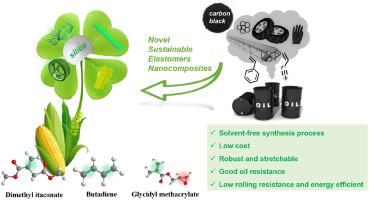Composites Part B: Engineering ( IF 12.7 ) Pub Date : 2022-10-28 , DOI: 10.1016/j.compositesb.2022.110383 Haijun Ji , Hui Yang , Xinxin Zhou , Chaoying Sun , Liwei Li , Shuainan Zhao , Jie Yu , Sai Li , Runguo Wang , Liqun Zhang

|
As the need for renewable and high-performance alternative elastomer grows, efforts have been made to develop bio-based elastic polymers for engineering applications. Herein, bio-based elastomers poly(dimethyl itaconate-co-butadiene)s (PDMIBs) were successfully synthesized by emulsion copolymerization of renewable monomer dimethyl itaconate (DMI) with partially petroleum-derived butadiene under mild conditions. It is an effective strategy to tailor PDMIB properties by comonomers with different feed ratios and to adjust the compositions and sequence distributions. The structure and thermal stability were investigated by FTIR, NMR, DSC analyses, etc. In terms of properties: (1) the vulcanizates showed excellent tensile strength (10.2 MPa), elongation at break (1146%) and toughness (37.6 MJ m−3) without filler reinforcement, which were obviously superior to the mechanical properties of most traditional petroleum-based synthetic rubbers; (2) Nanosilica-filled PDMIBs exhibited good mechanical properties, excellent abrasion resistance and oil resistance due to strong polarity in molecular chains; (3) Epoxy-functionalized poly(dimethyl itaconate-co-butadiene-co-glycidyl methacrylate) PDMIBG showed better silica dispersion and excellent dynamic mechanical properties. In summary, this new kind of bio-based elastomer PDMIBs can be used in multiple engineering applications, such as bio-based gloves, conveying belts, oil-resistant products and high-performance tire tread materials, etc. This study opens the door to the use of emulsion copolymerization and functionalization modification technology in the synthesis of new high-performance bio-based elastomer nanocomposites for the rubber industry.
中文翻译:

具有多种性能的基于衣康酸二甲酯的生物基弹性体及其纳米复合材料的制备
随着对可再生和高性能替代弹性体的需求不断增长,人们努力开发用于工程应用的生物基弹性聚合物。在此,通过可再生单体衣康酸二甲酯(DMI)与部分石油衍生的丁二烯在温和条件下乳液共聚,成功合成了生物基弹性体聚(衣康酸二甲酯-共-丁二烯)(PDMIB)。通过不同进料比的共聚单体来调整 PDMIB 性能并调整组成和序列分布是一种有效的策略。通过 FTIR、NMR、DSC 分析等研究了结构和热稳定性。在性能方面:(1) 硫化胶表现出优异的拉伸强度 (10.2 MPa)、断裂伸长率 (1146%) 和韧性 (37.6 MJ m - 3) 无填料增强,其机械性能明显优于大多数传统石油基合成橡胶;(2)纳米二氧化硅填充的PDMIBs由于分子链极性强,表现出良好的力学性能、优异的耐磨性和耐油性;(3) 环氧官能化聚衣康酸二甲酯-共-丁二烯-共-甲基丙烯酸缩水甘油酯)PDMIBG 表现出更好的二氧化硅分散性和优异的动态机械性能。综上所述,这种新型生物基弹性体 PDMIBs 可用于多种工程应用,如生物基手套、输送带、耐油产品和高性能轮胎胎面材料等。乳液共聚和功能化改性技术在合成橡胶工业用新型高性能生物基弹性体纳米复合材料中的应用。




















































 京公网安备 11010802027423号
京公网安备 11010802027423号